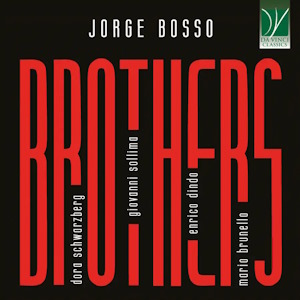
Jorge Bosso
Brothers
Mon cher frère, for cello trio and 12 cellos
Der Frühling der Minnesänger (The Spring of the Minstrels) after Bach’s Partita No. 2 for solo violin, for violin and chorus
I Dreamt My Last Breath in Your Arms, for 12 cellos
Symphonia, for 12 cellos
Siamo lacrime del fiume, for 8 cellos
Jorge Bosso (multitracked cello)
Mario Brunello, Enrico Dindo, Giovanni (cello trio)
Dora Schwarzberg (violin)
Tebje Poem/Kostantin Jakobson
rec. live, 23 December 2009, Philharmonic Hall, Krasnoyarsk, Russia (Der Frühling); details for cello works not supplied
Texts and translations available online
Da Vinci Classics C00886 [76]
Jorge Bosso is a cellist and composer, whose name was totally unfamiliar to me before requesting this disc to review. I can’t tell you his age or even his nationality because the booklet notes don’t provide those details and his website seems to be no longer operational. He appears on two of the Martha Argerich and Friends from the Lugarno Festival releases, so is certainly not an unknown quantity, and two of his compositions are listed on Presto. This, however, is the first release dedicated to his music.
The major work, at more than forty-two minutes, is a choral setting using Bach’s Partita No. 2 for solo violin. Yes, you read that correctly. The booklet notes suggest this follows in the tradition of such luminaries as Mendelssohn and Schumann who also wrote accompaniments (piano) for the violin. The ten movements comprise the five from the Partita, for violin and choir, interspersed with original “intermezzi” by Bosso for choir only, using texts from a variety of medieval sources including the poem Der Nibelüngen and Unter den Linden (by the medieval troubadour, Walter von der Vogelweide). It isn’t as odd as it sounds, and for much of the time, engages the listener. Only in the great Chaconne that finishes the work, lasting over sixteen minutes, do things start to wander, and the words get in the way of Bach’s masterpiece. The resonant acoustic and the rather dense scoring in places meant that the choir produces sounds rather than distinct individual words. Applause, less than rapturous it must be said, is included at the end of the work.
The four pieces for multiple cellos (where you see 8 and 12 cellos mentioned in the header, they are done by overdubbing) are similar in style and atmosphere: moody, dense, meandering. They are not “new age” as such, a little too intense and dissonant in places for that label, but they do have that “mystical” feel to them. None of them is short (5-10 minutes), and I’m afraid I tired of them before they were over.
The booklet notes are somewhat unsatisfactory. More than two of the three pages are given over to a discussion of Bach’s Violin Partitas and Sonatas and a somewhat rambling history of the choral piece derived from the Partita. Some commentary on the Bach work obviously is merited, but one is left wanting to know more about the actual music presented here. There is also a tendency to overstatement: for example, Dora Schwarzberg, the violinist in the Bach-inspired work, is described as “legendary”. She too plays on several of the Argerich/Lugarno releases, has a couple of solo releases, and performs her role here well enough, but to describe her in this way rather undermines credibility. I have already mentioned the acoustic for the live recording; those of the overdubbed cello pieces, presumably in a studio, sound fine.
It’s hard to know how to summarise this release. The four cello pieces are peas in a pod stylistically, so you probably need to listen to a few samples to know if they appeal. As for the choral piece, it has some very moving moments, and others where things seem to drift.
David Barker
Buying this recording via a link below generates revenue for MWI, which helps the site remain free



















